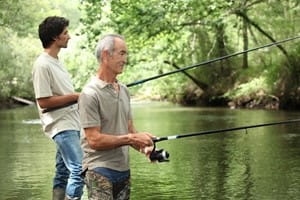
It's the season you've been waiting all year for: fishing season. There's nothing like waking up at the crack of dawn, grabbing your gear and heading to the river for a long day of casting them out and reeling them in. But are you aware that you aren't the only one out there trying to catch a meal? In fact you, the hunter, may just be the hunted.
Summer insects like ticks and mosquitos are patiently waiting for you to make the wrong move so they can swoop in and make you their next meal. Before you head out on your next fishing trip, read up on how you can stay safe from these tiny predators:
Let's be upfront, both of these insects have the potential to cause life-threatening diseases, and if you allow them to prick you, you have just exposed yourself to those diseases. There are a lot of reasons as to why you're in particular danger of falling prey to these bugs.
To begin, you've entered their ideal territory. Think about it: How did you get to the river or pond in which you're fishing on? You likely had to hike through a wooded area or tall grass, or both. Well, according to the Centers for Disease Control and Prevention, you've just hiked through the tick's home turf. They love to sit in messy plant life and wait for exposed ankles attached to unknowing visitors. That habitat is also ideal for mosquitos. They enjoy shady areas away from direct sunlight, but they also breed in stagnant water making your fishing grounds their eating grounds, explained American Mosquito Control Association.
If you want to fish in peace, don't worry, personal insect control is relatively easy. When you wake up and start getting ready, regardless of the hot weather, you'll want to wear close toed shoes with long socks and pants that cover your ankles so you don't have any exposed skin, warned the CDC. Wear long sleeves when you are in wooded area as well. Before you head out on your trip, be sure to give yourself a thorough dousing of heavy duty, waterproof insect repellent. It will be important to reapply the insect repellent throughout the day to keep away curious mosquitos.
At the end of the day, do a thorough inspection of your body for any signs of a tick or new mosquito bite. It's important to know if you've been bitten by an insect, in case you develop symptoms of pest-borne diseases, for which you should seek immediate medical attention. Common diseases typically begin with flu-like symptoms, however Lyme disease will look like a bruise in the shape of a target around where the insect bit you. Of course, you'll want to immediately remove any ticks with the following method provided by the CDC:
Unfortunately, these same bugs could also be running rampant in your backyard. Keep your grass and shrubbery trim so there are less places for ticks to hide and dump out any stagnant water - like from a bird bath - that might be attracting mosquitos. If you notice you have a particular problem give pest control management a call and have them come properly exterminate these pesky pests for you to help keep your family safe.